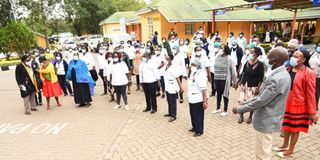Improve smaller hospitals for better UHC, experts urge govt

Nakuru Level Five Hospital health workers protest high Covid-19 cases among medics at the facility on October 19, 2020. Five teachers, 68 students test positive for Covid-19 at Bahati Girls Secondary School.
What you need to know:
- Corruption and mismanagement of public funds also identified as an obstacle to successful implementation UHC.
Kenya should fully equip its Level 1 and 2 health facilities in order to achieve Universal Health Coverage for citizens in far flung areas, the Health NGOs Network (Hennet) has said.
Dr Mercy Onsando, who is the chief executive of Hennet, made the appeal while addressing participants at a webinar on the World UHC Day hosted by the Media for Environment Science and Agriculture (Mesha).
The day is marked on December 12.
“One of the major challenges to achieving UHC is the deplorable state of the Level 1 and 2 public health facilities. This will improve the quality of healthcare for Kenyans that will be expected to access health care services at these hospitals,” said Dr Onsando.
She identified the low numbers of Kenyans with active health insurance cover as another threat to UHC, adding that the exorbitant cost of medical services continued to drive more Kenyans into poverty every year.
“According to government data, only 19 percent of Kenyans have some form of medical insurance. At least 1 million Kenyans sink into poverty every year due to medical bills they cannot afford,” said Dr Onsando.
She said the digital registration by the National Hospital Insurance Fund (NHIF) would see more Kenyans get enrolled on the UHC program, but warned that corruption in the national insurer could still derail efforts to provide Kenyans with quality health services.
Public funds
Data from the Kenya Demographic and Health Survey of 2014 shows that the country is still grappling with a mortality rate of 52 for every 1,000 children under five as well as a maternal mortality rate of 362 mothers out of every 100,000 giving birth.
The country’s UHC pilot phase that was launched in the four counties of Nyeri, Kisumu, Isiolo and Machakos recently ended, with no official indications given on the planned national rollout that seems to have run into financial headwinds as a result of the economic downturn brought about by the Covid-19 pandemic.
The medic also identified corruption and mismanagement of public funds set aside for UHC as a major obstacle to its successful implementation.
She called for greater public vigilance on the way public resources were utilised in the health sector, saying that the increased media pressure on government officials to account for the expenditure would result in greater transparency and efficiency in the sector.
“Kenyans are shocked by reports about corruption. The media should continue to highlight such cases as this will lead to greater accountability on the part of those entrusted with the responsibility of spending public funds on the health care services that our people need,” she said.
On her part, Smile Train’s regional director and Africa vice president Dr Esther Njoroge said Kenyans in far flung and marginalised regions are in danger of missing out on UHC because of being forced to trek for long distances to reach the nearest health facilities.
“The government should also step up efforts to ensure that there is a facility within five kilometres for every Kenyan,” said the medic.
Marginalised communities
Dr Njoroge, who is also a health systems management expert, said the health care sector needs to be streamlined to ensure that the marginalised communities and vulnerable sectors of society are also able to access UHC.
She asked the government to move with speed and build more health facilities in marginalised areas. This, she said, would bring much needed services, lifesaving healthcare services like maternal and child care as well as immunisation for children aged under five, closer to the people.
“Our government should act quickly and ensure that the farthest one can go before finding a health centre is five kilometers. This will go a long way in improving access to health care for most people in the marginalised areas of the country,” said Dr Njoroge.
According to the medic, the key to success in providing efficient UHC services lies in developing a system that addresses the health challenges faced by Kenyans.
She urged the government to strengthen preventive or primary health care services by supporting the training and empowerment of community health volunteers (CHVs).
“Kenya should implement a people-centred UHC, through the establishment of health systems that are centred on the health needs of individuals rather than diseases. Boosting primary health care by supporting CHVs is also a priority in the delivery of UHC,” she said.
She emphasised on the employment of sufficient health personnel to meet the staffing requirements set by the World Health Organisation (WHO), adding that the country needs at least 100,000 medical workers to serve its 47m strong population.
“We need to employ at least 100,000 medical workers to meet the need of our population as recommended by the WHO.It is also important that we address their welfare so that needless deaths such as the recent demise of Dr Stephen Mogusu are avoided,” said Dr Njoroge.





